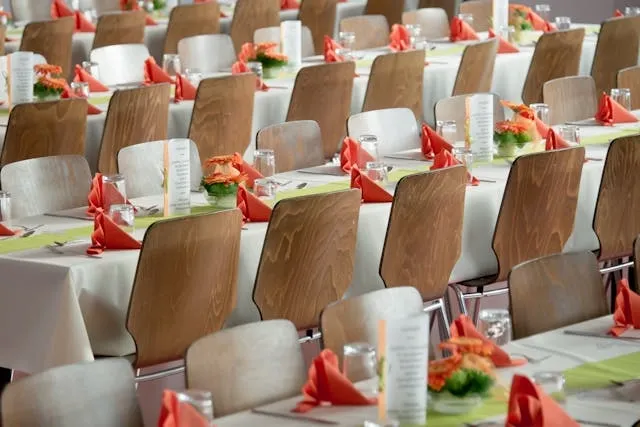Corporate Event Planning: Guide And Tips To Making A Successful One
Corporate event planning takes attention to detail. You need clear objectives from the outset and seamless execution. In this guide, we offer essential tips and strategies to organize a successful corporate event to meet business goals and make the right impression.

Key Takeaways
- Corporate event planning starts with establishing clear goals for your event. This lays the foundation for the entire planning process.
- Meticulous planning is key, including budget management, venue selection, scheduling, and attention to detail.
- Engage attendees with interactive elements, appropriate themes, and high-quality A/V experiences.
- The look and feel of your event are also key. We supply high-quality custom polyester tablecloths that can be tailored to your aesthetic and practical needs.
Table of contents
-
Corporate Event Planning
-
What Is A Corporate Event?
-
Corporate Event Planning Tips
-
How Do You Plan Types Of Corporate Events Successfully?
-
Corporate Event Planning Checklist
-
How To Attract Clients For Your Corporate Event Planning Services
-
What Are The Key Strategies And Best Practices In Corporate Event Planning?
-
What Does A Career In Corporate Event Planning Look Like?
-
How Do You Act And Network At A Corporate Event?
-
What Are The Differences Between Corporate And Business Events?
Corporate Event Planning
Corporate event planning is all about organizing and managing business-related events such as:
- Conferences
- Seminars
- Product launches
- Team-building activities
The primary goal is to make the event meet the company’s goals. Common ones include strengthening client relationships, boosting employee morale, or showcasing products.
To plan effectively, you must pay attention to the details, from selecting a venue to scheduling logistics and branding. In business, well-executed corporate events can boost your brand image, foster networking opportunities, and drive business growth
Strategic planning makes events run seamlessly and deliver clear messages. Work hard on them to create memorable experiences and have a positive impact on attendees.

What Is Planning For A Corporate Event?
There are several key steps to event planning for corporate events. It starts with establishing your goals, such as product promotion, client engagement, or team-building. Once you do this, you can move on to logistical considerations, which include:
- Budget management
- Venue selection
- Scheduling
- Catering
You must pay attention to the small details, covering elements like seating plans, A/V needs, and finding the best table covers for events like yours. Communicate effectively with vendors and coordinate timelines carefully.
A comprehensive plan helps deliver a seamless event that aligns with business goals and provides a professional experience. Execute yours carefully to leave a lasting impression on attendees.
What Is A Corporate Event?
A corporate event is a gathering that a business organizes for a specific professional purpose. Common corporate events include:
- Conferences and seminars: Designed to share knowledge and network.
- Product launches: Showcasing new offerings.
- Team-building activities: Events to strengthen relationships and collaboration between employees.
Corporate events can also include annual meetings, award ceremonies, and client appreciation events. Each of these serves a unique purpose, which might be fostering industry connections, motivating employees, or promoting company achievements.
With the right corporate event planning, these occasions can play a key role in business. According to Freeman, 70% of attendees believe in-person events are the best sources of training and professional content.
Types Of Corporate Events
Corporate events come in many shapes and forms, with their own goals and features. Here are a few common types that you will need to consider in corporate event planning:
- Meetings: These happen regularly. The focus is on discussions, updates, or decision-making.
- Product launches: Introduce new products to the market, blending marketing and networking to generate buzz.
- Corporate retreats: These emphasize team building and employee development in a more relaxed setting, improving morale and encouraging collaboration.
- Conferences and seminars: Industry experts share knowledge and expertise with networking opportunities.
- Award ceremonies: An opportunity to celebrate employee achievements to boost motivation and company culture.
Each event serves its own purpose, with various considerations for corporate event planning like table cover ideas to create the right atmosphere.
Planning for an event with presentations or demonstrations?
Work with us to create custom demonstration table covers that fit your brand and venue for a cohesive and stylish aesthetic to captivate the audience.
Corporate Event Planning Tips
Let’s look at some tips and strategies across all aspects of corporate event planning from concept to execution that will help your preparations.
20 Corporate Event Planning Tips To Run A Successful Event
If you are a beginner, aim to master the basics of corporate event planning. These include effective communication, strong organizational skills, and attention to detail. Here are 20 tips for your planning process:
- Define clear event goals from the outset.
- Set a realistic budget.
- Know who your target audience is.
- Select a suitable venue.
- Plan your agenda in detail.
- Focus on branding and theming with tools like our custom wholesale tablecloths.
- Create a comprehensive timeline.
- Prioritize the experience of your guests.
- Partner with reliable vendors.
- Ensure a proper A/V setup.
- Organize the logistics of transportation.
- Offer engaging content and activities.
- Use event management software where possible.
- Promote the event effectively.
- Ensure your on-site registration is seamless.
- Plan for dietary restrictions.
- Be prepared to make last-minute changes.
- Collect attendee feedback after the event.
- Network carefully to secure future clients.
- Follow up with clients to build long-term relationships.
Build credibility by consistently delivering quality events. This will lead to client referrals and repeat business. With confidence, clear vision, and strategic networking, you will help secure more business with events.
How Do You Plan Types Of Corporate Events Successfully?
Corporate event planning begins with understanding the nature of your event and its goals and audience. Your aims may be to foster networking, celebrate achievements, or build team morale. Understanding them guides decisions on everything from the venue to the menu.
To plan effectively, you need to set a clear budget, choose the best location, and organize a timeline for smooth execution. According to a survey from Knowland, 47% of event planners agree that costs are the top area of dissatisfaction. Find opportunities to cut costs without sacrificing the quality of the event, focusing on attention to detail, effective communication, and flexibility.

How Do You Plan A Small Corporate Event?
Corporate event planning for smaller events requires a focus on delivering an intimate, engaging experience. Define what the purpose and objectives of your event are, then set a budget that aligns with your goals. Explore venues to find one that matches the scale and atmosphere of your event.
Plan the agenda carefully, ensuring you devote enough time to structured activities and informal networking opportunities. Catering should be a good fit for the event type, and it is crucial to deliver quality service. You could even consider personalized touches like custom name tags or branded table settings.
Be sure to maintain clear communication with all vendors and stakeholders to ensure smooth execution when the day arrives.
How To Plan A Corporate Dinner Event?
To plan effectively for a corporate dinner, you must carefully coordinate several key elements:
- Select a venue that suits the event’s tone, whether formal or casual.
- Plan the menu very carefully. Choose dishes that accommodate various dietary preferences while reflecting the event’s elegance.
- Prepare entertainment like live music or keynote speeches to align with the evening’s objectives.
- Plan your essential equipment. For example, custom printed tablecloths can enhance decor, deliver a polished touch, and help with branding at the event.
Create a detailed schedule that outlines the timelines for each part of the event. With a reliable timeline, you can ensure smooth transitions to help the event run seamlessly from start to finish.
Get the right look for tables at your next seminar
Incorporate buying custom seminar table covers into your event planning process to ensure you get a refined look to immerse attendees in your brand.
Create yours hereCorporate Event Planning Checklist
When planning your corporate event, this checklist should help ensure nothing is missed:
- Define objectives: Clarify your purpose and goals.
- Set budget: Allocate funds for various aspects like venue, catering, and contingency plans.
- Select venue: Make sure the location fits the event size and theme.
- Create schedule: Develop your timeline, accommodating setup and breakdown times.
- Menu planning: Choose dishes and beverages that account for dietary restrictions.
- Arrange entertainment: Block any speakers or performers you will need.
- Organize equipment: Arrange for essential A/V gear and get wrinkles out of tablecloths to prepare elegant table settings.
- Send invitations: Manage RSVPs and communicate your event details.
- Coordinate logistics: Arrange transportation, parking, and on-site support.
How To Attract Clients For Your Corporate Event Planning Services
To attract clients for a corporate event planning service, you need to generate leads through targeted online marketing and networking opportunities. This is the first step to building a strong personal brand and leveraging professional networks.
When you get your first client, create a compelling portfolio that showcases your skills. Use effective pitching techniques to demonstrate the value you can bring. And apply diverse strategies to promote your events, including:
- Social media campaigns
- Email newsletters
- Industry partnerships
This will help maximize visibility and engagement. Through the combination of strategic lead generation, effective personal branding, and proactive client outreach, you can effectively secure corporate event planning opportunities.
Could a personalized table runner be right for your event?
Consider different table cover options when planning your event. Our custom print table runners can feature any design you want for the right aesthetic.
What Are The Key Strategies And Best Practices In Corporate Event Planning?
Key strategies in corporate event planning including the setting of realistic budgets and managing costs by carefully allocating funds and negotiating with vendors. You must also understand effective marketing techniques, like targeted social media campaigns and email outreach.
The theme and format of your event are important, and you can get the tone right with fundamental strategies like learning how to decorate with table runners. Keep attendees engaged by planning interactive elements like Q&A sessions and live polls.
High-quality A/V experiences are key to enhancing the event. A visually- and acoustically-memorable atmosphere can make a big difference. Focus on these areas for an impactful corporate event.
What Does A Career In Corporate Event Planning Look Like?
A career in corporate event planning involves the management of a diverse array of tasks every day. Corporate event planners coordinate with clients in order to:
- Understand their needs
- Source and bok venues
- Arrange catering
- Oversee logistics
Daily responsibilities include creating detailed event schedules, liaising with vendors, and handling budgets. It is common for planners to be juggling multiple events at once. They must address challenges like last-minute changes and problem-solving as they go.
It is an event planner’s responsibility to ensure every detail aligns with the client’s vision. From setup to execution, you must have strong organizational skills, creativity, and adaptability.
How To Break Into Corporate Event Planning?
Breaking into corporate event planning begins with building the foundation you need. Gain experience through internships and volunteering opportunities at events to understand the industry’s demands. Start networking by attending industry events, joining professional associations, and connecting with established planners.
You must develop a compelling portfolio that showcases your skills and past work. It may also be helpful to earn certifications or take courses in event management to gain credibility. Leverage social media and other online platforms to market yourself and attract prospective clients.
Finally, keep updated on industry trends and best practices. This will help you offer innovative solutions to demonstrate your expertise.
How Much Do Corporate Event Planners Charge?
Clear communication about budget and expectations helps ensure accurate event planner pricing. There are various factors that go into the charges for corporate event planners. These include:
- Event size
- Planning complexity
- Location
Fees may be structured as a flat rate, hourly rate, or percentage of the overall event budget. Key influences on the cost include things like the number of attendees, the amount of customization needed, and the scope of the services you require.
You may find that additional costs arise for specialized elements like A/V equipment and decor items like custom digital print tablecloths. Planners also consider the level of experience and reputation when setting their rates.
Immerse attendees in your brand at your conference
Adorn tables at your conference with custom conference table cloths for an engaging and immersive environment that also offers comfort and practicality for the event.
Explore design options hereHow Do You Act And Network At A Corporate Event?
Courtesy and professionalism are important at corporate events. Attendees should be dressed appropriately and you should maintain a polite demeanor throughout. Approach networking with clear intent:
- Introduce yourself confidently
- Listen attentively
- Engage in meaningful conversations
Open body language and eye contact can help convey interest. It is helpful to prepare a concise elevator pitch to communicate your role and objectives. If you make new contacts, follow up promptly after the event to solidify connections.
Be mindful of group dynamics and try not to dominate conversations. You need to appear approachable, respectful, and proactive to foster valuable relationships and make the right impression.

What Are The Differences Between Corporate And Business Events?
There are a few distinctions between corporate and business events:
- Corporate events: Organized by companies to achieve broad objectives like team-building, employee recognition, or stakeholder engagement.
- Business events: Usually focused on specific business functions like industry seminars or client meetings in order to achieve immediate business goals.
Understand these distinctions to tailor event planning strategies. Work with us to get high-quality custom table covers for any event type, enhancing the atmosphere and strengthening your branding whilst delivering a high-quality tabletop covering to protect against damage.
Frequently Asked Questions About Corporate Event Planning
What Is Corporate Event Planning?
The organizing and managing of business-related events like conferences, seminars, networking events, and more. It involves preparing budgets and objectives, selecting venues, organizing schedules, and more.
What Are Four Tips For Corporate Event Planning?
Our top tips would be to define clear event goals and set a realistic budget from the outset. Get a robust understanding of your audience and select a suitable venue for the size and theme of your event.